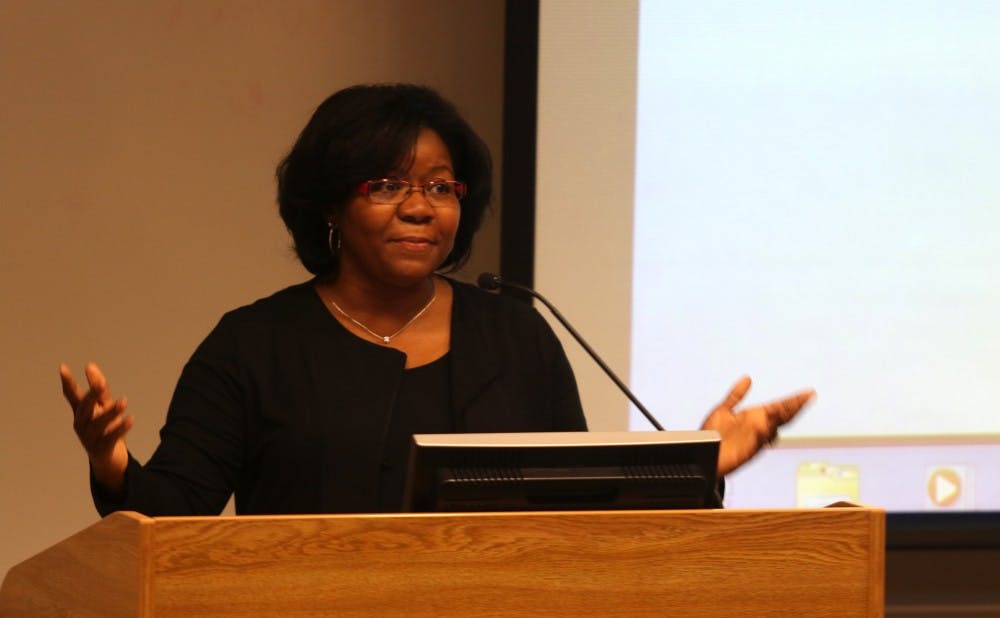Nearly a year since it was first approved, the Academic Council addressed the Faculty Diversity Task Force and its purpose on campus.
The task force, which began work in April 2014 after being authorized in February, is a committee that aims to understand Duke’s current status of diversity and inclusion, as well as examine the best practices of faculty hiring processes and actions to provide a vision for the future. At the Academic Council meeting Thursday, faculty discussed the structure and activities of the Faculty Diversity Task Force.
"We want to look at why diversity is good, how leaders can be held accountable and what specific types of programs have proven effective in the past,” said Trina Jones, professor of law and co-chair of the committee.
Jones said that any conclusions made so far, however, are too preliminary and need more time for examination and reflection. The task force wants to both look at Duke internally and make comparisons to national trends, she said.
The task force consists of seven subcommittees, collectively comprised of 59 faculty volunteers. Each subcommittee focuses on a specific goal of the task force, examining institutional mechanisms for advancing diversity on campus.
“We’ve had one year to do work, and we hope it will serve as a template for other forms of diversity on campus," Jones said. "We view this as piece of a bigger project of establishing a welcoming environment.”
The use of data, obtained through self-report surveys, has enabled the force to benchmark Duke and compare it to internal trends at peer institutions. The data assesses individual profiles and patterns, including demographics such as gender and race. Nan Jokerst, J. A. Jones Professor of Electrical and Computer Engineering and co-chair of the committee, added that there is currently no data on sexual orientation, but that the newest survey does include related questions.
“At this point we perceive that this is a big hole in the understanding of our demographic data at Duke,” she said.
One subcommittee focuses on identifying the best practices in improving faculty and administrative diversity, evaluating key areas such as monetary equity, retention and work climate.
“How does [the faculty] experience their work environment?” said Anathea Portier-Young, associate professor of Old Testament and co-chair of the subcommittee. "Is it an environment that promotes inclusion actively? Or do they feel excluded and devalued? Those are the kinds of things that we’re looking at.”
Another subcommittee focuses on soliciting input from and informing the Duke community, using resources such as social media and town hall meetings.
“One of the basic things we wanted to do was to be transparent and open to the Duke community,” Jokerst said.
Currently, the task force has received the preliminary report drafts from six out of seven of the subcommittees, and an eighth subcommittee consisting of the entire force will begin to finalize recommendations in March.
Following the Diversity Task Force presentation, one professor voiced support towards exploring the purchase of plagiarism software, adding that it is something worth discussing.
“It’s something we’ll look into and put it on our main list,” said Joshua Socolar, council chair and professor of physics.
In other business:
Susan Lozier, Ronie-Richelle Garcia-Johnson professor of earth and ocean sciences, reported two candidates for the 2015-17 Academic Council chair position—Jokerst and Emily Klein, a geochemistry professor in the Nicholas School of the Environment. The council members will vote within the next month, and results will be announced at the February meeting.
Michael Schoenfeld, vice president for public affairs and government relations, was scheduled to report on University communication and advocacy, but was unable to attend due to public response regarding an amplified Muslim call-to-prayer from the Chapel.
Socolar said the February meeting will focus on developments at Duke Kunshan University.
Get The Chronicle straight to your inbox
Sign up for our weekly newsletter. Cancel at any time.

